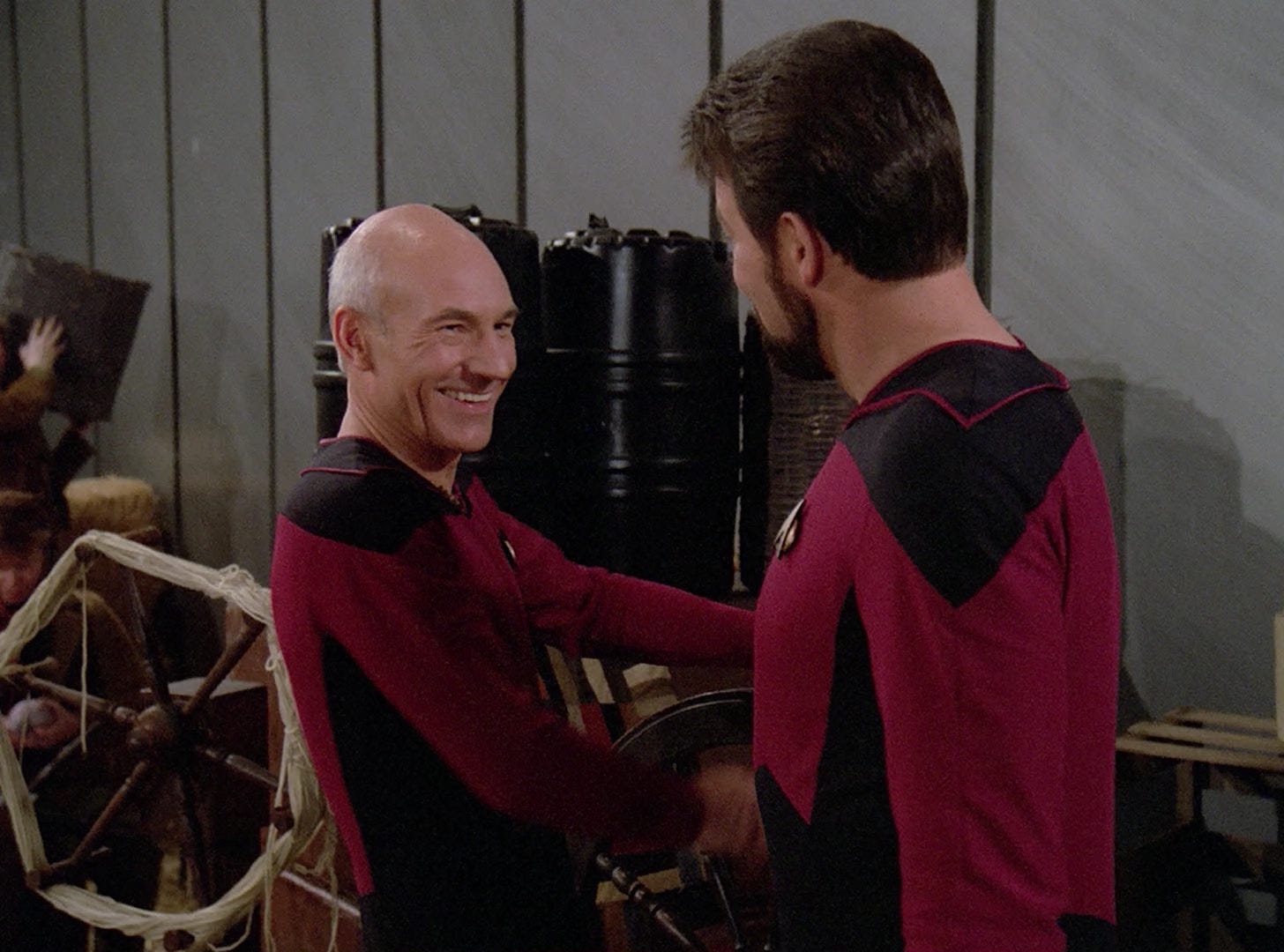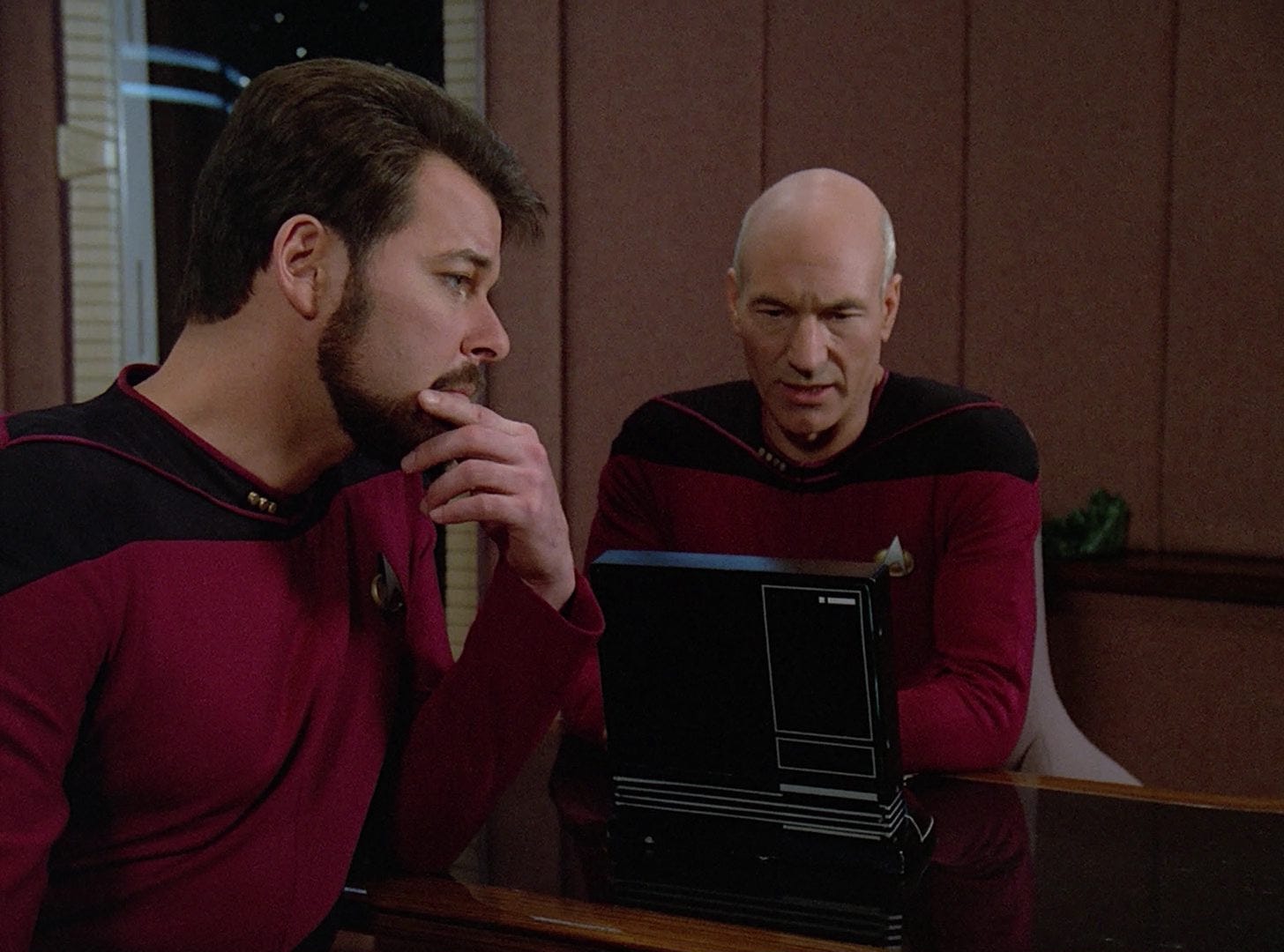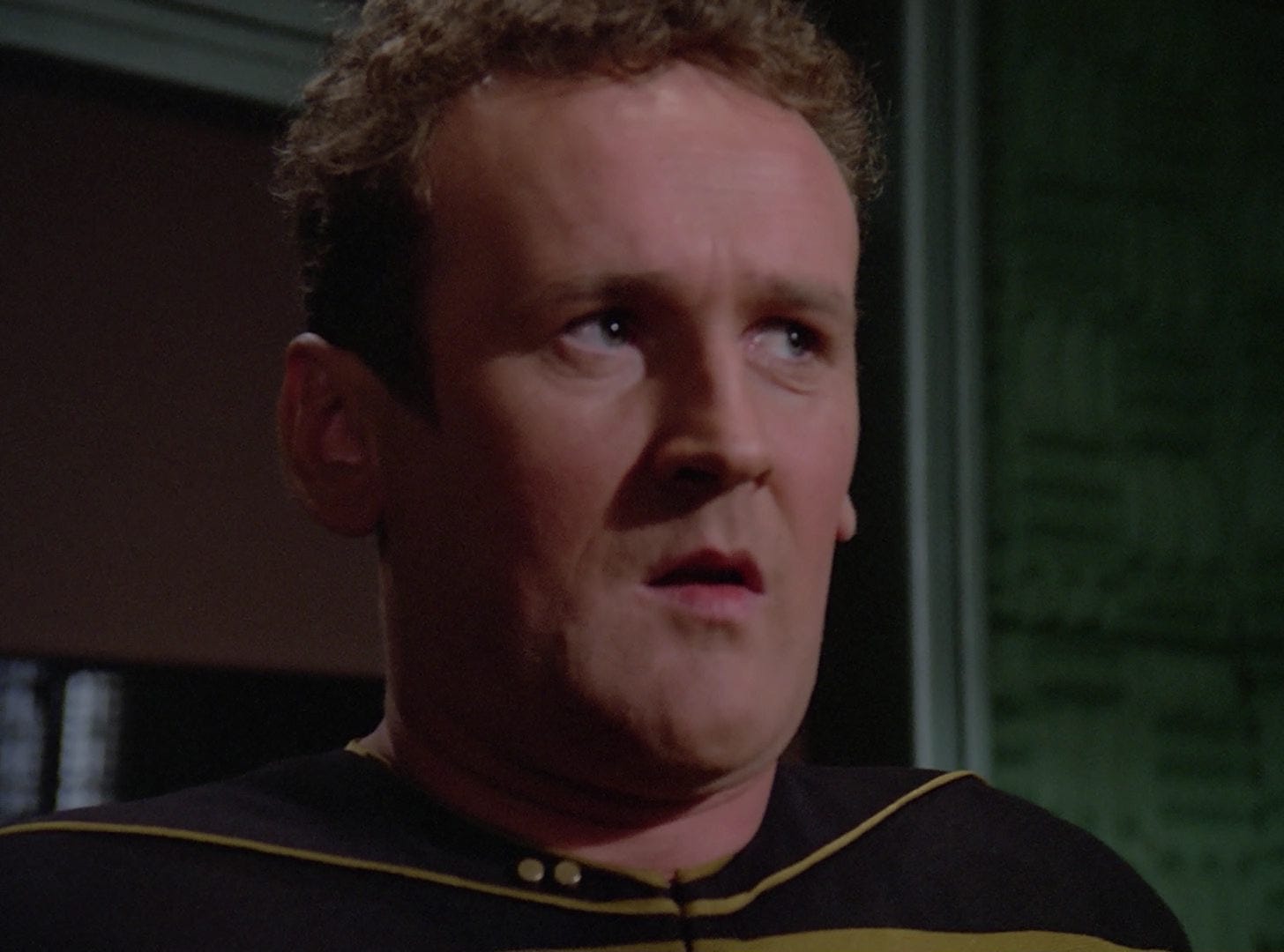Up the Long Ladder
Two stories, both alike in lack of dignity, collide upon our fair Enterprise
We open to dramatic music. Worf is acting antsy, and Picard wants Riker in his ready room. Something exciting must be happening! But no, it's just a distress beacon with a signal that hasn’t been used for centuries. Then Worf collapses - he didn’t even have an alien wail on him first! The Enterprise whooshes over to rescue the colonists in distress, who turn out to be afflicted with every Irish stereotype imaginable. Riker wastes no time at all in getting it on with the colony leader's daughter - does the Prime Directive mean nothing to this man?! On to the second leg of this story there’s another colony, and its made entirely out of clones. They are running into problems because they’ve photocopied themselves so many times they’re starting to fade, so they kidnap Riker and Pulaski and purloin their DNA. They’re miffed, and go and murder their clones - which everyone treats as perfectly normal. Eventually, Troi reaches the conclusion the audience leapt to the moment we knew there was a second colony - the two wildly different cultures have to cross-breed. Fortunately, we don’t have to watch.
Words
This screenplay was originally entitled “Send in the Clones”, a terrible pun (my writing mentor, Terry Pratchett would have called this a 'poon') - a name that survives in a line of dialogue, of course, but this was a last minute addition during shooting.
There’s a huge mess of words doing a variety of different imaginative work in the story - which is a sure sign that something is not quite right. A tight sci-fi story will use a few load-bearing words to support the framework of the story... here, the story is so diffuse and unfocussed, the wild swings in terminology feels like its compensating for the lack of firm foundations. Nonetheless, there's some interesting word choices and ideas in play.
Picard invokes the name ‘European Hegemony’, saying this was “the first stirrings of world government” - looking at the state of the European Union today, that doesn’t feel very utopian anymore.
To foreshadow the two different colonies we get a laundry list of terms intended to express the contrast e.g. ‘cellular comlinks’ versus ‘spinning wheels’. Along with this, the name of a made-up philosophy, the ‘Neo-transcendentalists’. This isn’t entirely plausible. The Transcendentalist were a movement in New England in the 1820s and 1830s, influenced by the philosophy of Herder, Hume, and Kant... to say that the Bringloidi have no plausible connection to this movement is an understatement.
There’s a completely bizarre subplot in the first two acts about Worf having rop’ngo (which the screenplay just called a “childhood ailment”, omitting the comparison with measles in the final episode). The trouble with this storyline is it goes nowhere and does nothing. Even calling it a B-plot feels generous. It’s nice that Worf invites Pulaski to join him in the Klingon tea ceremony, but so what? And what does any of this have to do with the themes or plot of this week’s episode?
I note that the screenplay calls the smoking Klingon brew Worf gives to Danilo Odell chech'tluth - which would mean ‘drunkard's drink’ but Worf actually says joq'tluth, which means ‘drink of the bold’. Since both names show an understanding of Klingon, Marc Okrand (who created the language) has to have been working behind the scenes here. Why he changed the name is anyone’s guess, though, as literally nobody could have an issue with either name at this point in time, since Okrand was essentially the only person who knew any Klingon in 1989!
In the later acts, there is an attempt at using ‘clones’ as a load-bearing concept, and with it ‘replicative fading’, which is a plausibly sci-fi sounding concept that doesn’t actually make much sense in the context of replicator technology. My biggest problem with this part of the episode is the clumsy way screenwriter Melinda Snodgrass thumps her political rhetoric in a way that seems more likely to convince people of the justice of the opposing position. She says of this episode:
I got enormous flack from the right to life coalition because they destroyed the clones. They thought I was condoning abortion. In fact, I did put a line in Riker’s mouth that was very pro-choice and the right to life coalition went crazy. He says “I told you that you can’t clone me and you did it against my will, and I have the right to have control over my own body.” That's my feeling and it was my soapbox, and it was one I got to get on. I was supported by Maurice all the way.
Bodily autonomy is an equitable principle, although it’s taken a beating in recent years with almost every political faction having a weaselly excuse for why they don’t have to respect it in certain narrowly chosen cases. But even from the perspective of 1989 we have to ask: did Snodgrass really think she was going to persuade people of the justice of termination of pregnancy by showing adult humans vaporised because their DNA was stolen from someone else? We can hardly avoid asking: if the clones had already been awake and conscious, would it still have been okay to murder them...? By looking so patently like murder, this scene plays right into the very arguments Snodgrass is trying to argue against - what a mess!
Like so many contemporary political issues, abortion is not so much a clash of principles as it is simply a bitter source of hatred between two camps that don’t understand each other, and have given up even trying to do so. A situation more antithetical to Star Trek’s guiding ethos is hard to imagine.
Acting Roles
As a bottle show, the screen time is filled up with guest stars. Jon de Vries is suitably menacing as the clones, Wilson and Victor Granger, although he actually has very little to do except act stuffy.
Barrie Ingham's painfully Irish Danilo Odell is uncomfortable to watch, although it's hardly his fault. He does what he can with the script he's been given.
Ingham had a huge career with over a hundred credits, but what leaps out at me most is that he played Alydon in the 1965 Doctor Who film, starring Peter Cushing as the Doctor. In the movie (which is an adaptation of the show’s second serial, “The Daleks”), Ingham’s Alydon takes over the leadership of the Thals after the Daleks kill their original leader. It's basically a major role in a minor movie, but for sci-fi fans it’s still quite a feather in your cap.
Rosalyn Landor at least has some charisma as Brenna Odell, but serving her up as a sexual conquest for Riker feels cheap.
Landor had quite a long career, but perhaps the most interesting role was her first: as a child actress she played Peggy Eaton in the iconic The Devil Rides Out, alongside Christopher Lee and Charles Gray.
Marina Sirtis’ Troi, sadly, is back to her level 1 power, declaring that the clones are hiding something. It feels like quite the retrograde step for her.
As for Colm Meaney O’Brien - he gets quite the reaction shot when the colonists first beam aboard with their livestock.
I imagine this horror on his face is quite genuine, given the teeth-grating Irish stereotypes he has to witness. By DS9, he's respected enough that he can persuade the production team to veer away from such painful clichés... but at this point, alas, he just has to grin and bear it.
Models, Make-up, and Mattes
So, given that the episode is a stinker, there must be something good in the SFX department? Nope. We have some revisits of planetary mattes we've seen before, most notably a revisit of the ringed Gravesworld planet from “The Schizoid Man”, and another of which appears here for the last time. But all we get that’s original is one measly new planetary matte painting for Bringloid V...
...and even that isn’t very good (although we’ll see it again in late season three). There’s a certain tiredness to the whole episode, and it already begins to feel that head writer Maurice Hurley is ready to move on. He leaves in just four episodes time.














Not one of TNG's finest moments for sure, however, Ingham and Landor do make good of what they're given. Ingham is a truly versatile and engaging performer.
Rosalyn and I chat on Twitter. She's a great lady. She told me what a dream come true it was for her to work on TNG, as Star Trek - TOS - remains one of her favorites. She said her first day on set felt surreal, as there she was boarding the Enterprise herself. And I always compliment Rosalyn on 'Devil Rides Out' - probably my favorite Christopher Lee horror movie offering next to Lee's many Hammer Dracula classics.
Yup, that episode was a mess from top to bottom. Never mind, when you have so many episodes to get through, you can get away with a few duds.